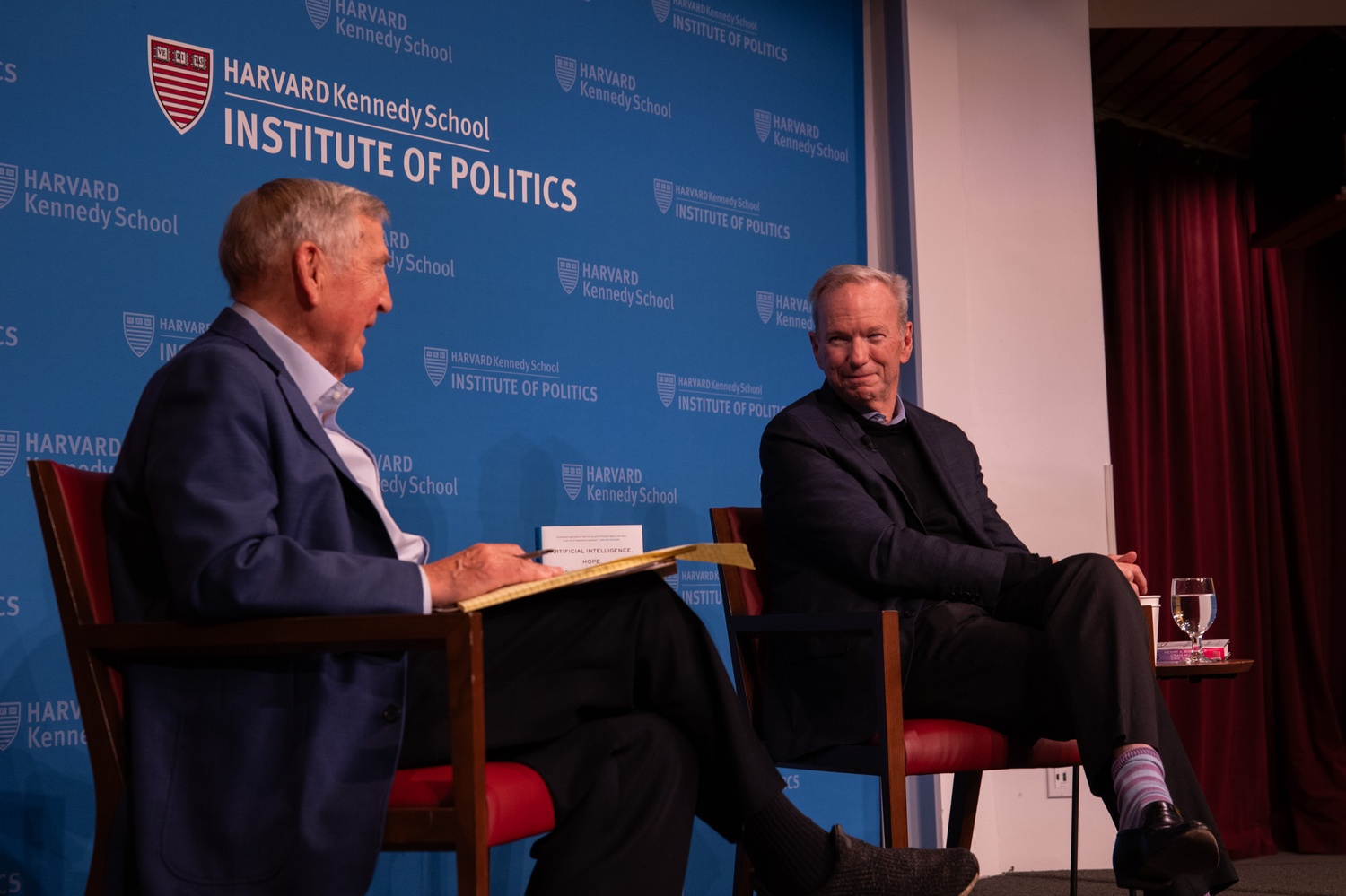
News
Summers Will Not Finish Semester of Teaching as Harvard Investigates Epstein Ties

News
Harvard College Students Report Favoring Divestment from Israel in HUA Survey

News
‘He Should Resign’: Harvard Undergrads Take Hard Line Against Summers Over Epstein Scandal

News
Harvard To Launch New Investigation Into Epstein’s Ties to Summers, Other University Affiliates

News
Harvard Students To Vote on Divestment From Israel in Inaugural HUA Election Survey
Former Google CEO Eric Schmidt Says U.S. Trails China in AI Development

Former Google CEO Eric E. Schmidt said the U.S. is falling behind China in the race to develop more powerful artificial intelligence at a Harvard Institute of Politics forum on Monday.
Schmidt’s comment at the event — which was moderated by former Harvard Kennedy School Dean Graham T. Allison ’62 — signals a shift from the stance he shared at the IOP last October, when he said the U.S. was leading China on AI development.
During the talk, Schmidt said in addition to access to talented engineers, powerful chips, and large data sources like the U.S., China also benefits from having more electric power to fuel the training of the AI models.
“When you write the successor to your book, you’re going to add a chapter of how we screwed up in this area,” Schmidt said to Allison, an expert on U.S.-China relations.
Schmidt partly attributed China’s newfound lead in AI development to the country’s sizable investment in the industry, specifically noting government subsidies for AI-related Chinese companies that have spurred development in the sector.
“Part of their strategy is to essentially subsidize — they over-invest in key areas,” he said. “This is something we in America don’t do.”
Schimdt added that though he and other experts had previously acknowledged that the U.S. would struggle to restrict China’s access to advanced AI software, they had believed the U.S. could successfully stymie China’s AI development by cutting off its supply to advanced chips.
“We knew that we couldn’t constrain the software, because software is almost impossible to bottle — it leaks,” he said. “But we figured you could constrain hardware and network performance, and it worked for a while.”
Today, Schmidt said, Chinese firms have matched U.S. hardware development by building powerful chips of their own.
“They appear to have been able to assemble enough chips to pull it off,” he said.
Schmidt also discussed artificial general intelligence — a system that matches or even surpasses human cognitive abilities — and said the superpower that first achieves this gold standard for AI could shape the balance of power between the two countries.
According to Schmidt, AGIs could serve as “AI scientists” that advance scientific development at a pace far quicker than human scientists, meaning that the first country to build AGIs would enjoy “a very, very profound advantage.”
“It does matter who’s first,” Schmidt said. “Even small differences, like a few months, can get amplified.”
Despite his concerns about the AI race between the U.S. and China, Schmidt said he has “historically been a techno-optimist” about AI development and discussed ways that the two global superpowers could establish partnerships to regulate AI.
The first issue the countries could strike agreements on, Schimdt said, was a policy against giving AI systems control of military systems and the capability to launch military attacks.
“The most obvious restriction that should be agreed to is the use of automatic weapons systems,” he said. “There is a scenario where the AI system could decide on its own to launch a war, especially if it had direct access to weapons.”
Schmidt also pointed to the potential benefits from AI, including the faster discovery of new drugs and more accessible and personalized education.
“Humans like to talk about the downsides, because fear is a great motivator,” Schmidt said, but added that he was optimistic about AI’s potential upside.
“I think technology has brought many, many benefits to all of us,” he said.
—Staff writer William C. Mao can be reached at william.mao@thecrimson.com. Follow him on X @williamcmao.
—Staff writer Dhruv T. Patel can be reached at dhruv.patel@thecrimson.com. Follow him on X @dhruvtkpatel.
Want to keep up with breaking news? Subscribe to our email newsletter.
